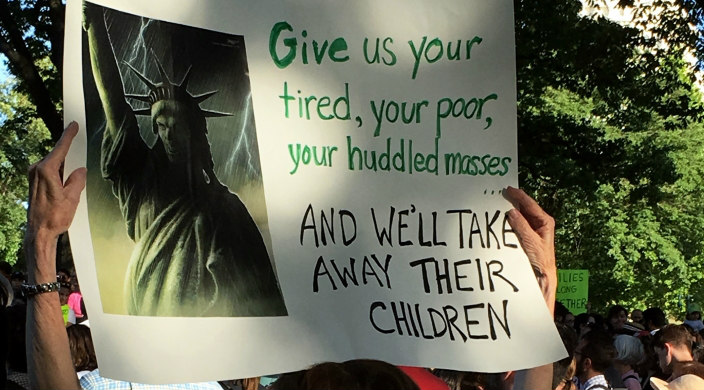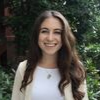
Take a moment to think about your mother or your father; your daughter or your son. Now, think of being forcibly separated from your loved one, without reasonable cause, without warning, without knowledge of where either one of you may be headed, and without a clue as to when you will see them again. All you can hear is the sound your loved one crying out your name.
This scenario may evoke thoughts of one of the darkest times in Jewish history. Yet, this is happening today, in America.
Since Attorney General Jeff Sessions announced the administration’s “zero tolerance” policy for immigration, this has led to a de facto policy of family separation at the southwest border. As countless outlets have reported, the United States had been separating immigrant families at our border at an alarming rate. Children were being taken from their parents, and in some cases separated from siblings. These children were then classified as unaccompanied minors, meaning they were being detained under the Office of Refugee Resettlement. These detention centers for minors exist across the United States, meaning many children were sent far away from their parents to live with temporary guardians, all while their parents are being held in adult detention centers under the Department of Justice.
When we hear that someone has been detained, we may assume that they are guilty of a crime. But, that is far from the case here. These immigrants – many of whom are seeking asylum – are in detention centers as they await trials, before presumably being sent back to whatever they were fleeing back home.
Attorney General Sessions himself has stated that deterrence, rather than crime, is the driving force behind the tactic of separation and detainment. This administration is using the cruel and draconian practice of family separation to scare other immigrants and refugees from attempting to cross the border into America.
As Jews, our faith and history demands that we be concerned about immigrants. Our faith compels us to show compassion for the stranger in our midst. From our experience, too, we know what it is like to be persecuted, oppressed, and separated from our families. We also know all too well what forces people out of their countries as refugees and immigrants in search of a better life somewhere new. Recognizing that we were once strangers too, we know it is our duty to help the strangers in our midst. There are sentiments we can offer in the name of prayer, like these prayers for the children separated from families at our border, written by Reform leaders. There are also actions we can take.
My family history, and moreover, my Jewish history compels me to take action at this critical crossroads in immigration policy. From studying Jewish history, I know of many periods of time when we were fleeing persecution. I am also well aware of the times we were not welcome and turned away, as was the infamous case with the U.S.S. St. Louis carrying refugees from Europe amidst the Holocaust, only to be turned away at our borders. Furthermore, I have heard many stories of the traumatic impact of family separation, and how difficult that may be to recover from.
The thought of family separation, restricting immigration and refugees, as it is being practiced right now is appalling. My Jewish identity compels me to welcome the stranger and protect them. I am further inspired by the passionate show of action by leaders from the Reform Jewish community and 40 other faith leaders – who traveled to McAllen, TX, where they bore witness and took a stand – to take a stand of my own.
As a summer legislative assistant at the Anti-Defamation League (through the Religious Action Center's Machon Kaplan program), I have been working on immigration and refugee rights advocacy. The ADL expressed deep concern over the zero tolerance policy in a statement, and has been advocating for its withdrawal since it was first announced. The RAC and the ADL, along with 54 other national and 291 state and local Jewish organizations signed onto a letter directed to Attorney General Sessions urging him to rescind the administration’s policy and put an end to family separation.
The president issued an executive order (EO) purportedly to address the widespread issue of family separation. However, this latest EO does not solve the problem, nor does it alleviate the suffering of the more than 2,300 children who have already been separated from their families. Furthermore, it does not address the mass criminalization of migrants – many of whom are simply seeking asylum. Rather, the EO allows for indefinite detention of migrants as a family – children included. This is not a solution.
We must look to Congress for more comprehensive solutions. Senator Dianne Feinstein of California introduced a Senate bill, and Representative Jerrold Nadler of New York a House bill, the “Keep Families Together Act." Both seek to end the policy, affirm the nation’s commitment to family unity, and reunite already-separated families.
Our Jewish faith values family, or mishpachah. We can all do our part to help ensure peoples’ mishpachah can reunite and remain together, and the Religious Action Center of Reform Judaism lays out eight ways to do just that. Call and email, your Senators and Representative and urge them to take swift action to reunite the children who have already been separated from their families. Help pass these pieces of legislation so that we can put help reunite families who were torn apart by this terrible policy.
Machon Kaplan is an internship program for undergraduate students interested in Judaism and social justice. Based in Washington, D.C., it provides students with a meaningful social justice internship, the opportunity to engage in study related to their internships and and making change more broadly, as well as an open reflective community with whom to share their experience. Students learn, through study and action, the interrelationship of Judaism and American ideals, as well as how change happens. Learn more.
Related Posts

Harnessing the Power of our Mothers Around the Seder Table

Melding Tradition and Innovation: Our Interfaith Toddler Naming Ceremony


